Respect for Diversity
Promoting Diversity
Perspective on Diversity
Diversity is an important management issue for the Company from the perspectives of making the best use of the capabilities of its diverse human resources, fairness, and risk avoidance. We are developing a working environment that makes it possible to mutually recognize and take advantage not only of nationalities and genders, but also differences in sexual orientation, involvement with family care, values, lifestyles, and other factors.
We also set up a diversity promotion site—“Hibikiau Chikara” (Strength in Synergy)—on our corporate intranet. Here, employees can learn about diversity, view examples from the workplace, and gather information on systems to support a good work-life balance.
Ideas Infused into Diversity Symbol

Imagine Kawasaki operations as a tree, shaped by many people with different personalities.
The tree grows quickly, with leaves and fruit adding color, and it thrives. In the same way, we who work at Kawasaki are an assortment of colors, our unique personalities and skills dotting the landscape of Kawasaki—and we grow, not only as individuals but as a company.
Focus
Promoting Diversity Through External Links
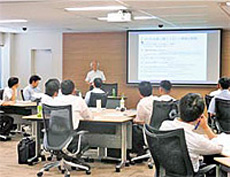
At Kawasaki, we believe promoting diversity and a good work-life balance are important components of management strategy, and we undertake activities toward these ends. In addition, to accelerate acceptance of these ideas within society, we enthusiastically participate in external study groups and work with other organizations and companies beyond a singlecompany framework.
A prime example of this is our involvement in the Research Project toward Realization of a Work-Life Balanced Society, a joint effort by Chuo Graduate School of Strategic Management and the private companies. The project’s objective is to convey the principles of the work-life balance concept widely through surveys and research. Kawasaki joined the project in 2013 and, as the model to follow, introduced work-life balance seminars for managers.
We are also a member of the Diversity Western-Japan Study Group, comprising chief diversity officers at companies in the Kansai region, The study Group Members share ideas and good examples of diversity in action and lobby corporate management and government to convey the principles of diversity concept widely. This study group coordinates the planning and execution of Pan-industry forums for company’s diversity and work life balance measures, for example, targeting female employees, employees in paternity leave and foreign nationals working in Japan.
Encouraging Greater Activity among Foreign Employees
In fiscal 2013, Kawasaki began recruiting non-Japanese university graduates. We continue to search globally, with new employees coming primarily from South Korea, China, Sweden and Australia. Given this global recruitment perspective, we prepared guidebooks for people who work with foreign nationals and distributed the materials to relevant divisions to improve communication between non-Japanese employees and their superiors and workplace colleagues and to help Japanese staff better understand foreign nationals who have different religious and cultural backgrounds.
Change in Number of Foreign Nationals (administrative and technical position only, as of April 1 for each year) (non-consolidated)
| FY2014 | FY2015 | FY2016 | FY2017 | FY2018 |
|---|---|---|---|---|
| 10 | 21 | 23 | 29 | 34 |
Promoting Participation by Women
For promoting participation in society by women, the Company hires women positively, in the first place. The numbers of women hired and those in managerial positions have been increasing year by year, and particularly in hiring, about 30 percent of the new college graduates in administrative positions are women.
In addition, we are also supporting the activities named "4U (For You) Network" of aimed at women widening the field of performance by learning from each other, where the participants can find good role models in the company and share wisdom to balance work with life events. In 2013 and 2014, the Carrier Design and Communication Training planned by the 4U (For You) Network was carried out for female employees and their supervisors. In 2016, furthermore, the Carrier Forum was held for approximately 180 women in management track positions who have worked with the Company for 10 years or less, where they learned how their seniors have made what they are now, and gave a thought to their respective career images in five years through the group discussion.
Also, considering the promotion of the appointment of women to managerial positions to be an important issue, we are working to develop more women resources with the target of "trebling by 2020 the number of women in managerial positions (section head or its equivalent or above) from fiscal 2015."
Number of Women in Managerial Positions (Section Head or Above; as of April 1 for Each Year) (non-consolidated)
| FY2014 | FY2015 | FY2016 | FY2017 | FY2018 |
|---|---|---|---|---|
| 15 | 17 | 23 | 26 | 29 |
Note: Figures include staff on external postings and staff on leave.
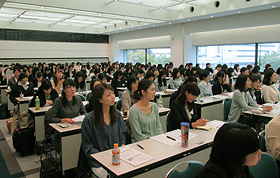
Focus
Kawasaki Receives “Eruboshi (Grade 2)” Certification (May 2016)
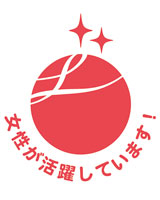
In May 2016, Kawasaki received “Eruboshi (Grade 2)” certification as an outstanding company for promoting women’s participation in the workplace.
The Eruboshi system is based on the Act on Promotion of Women’s Participation and Advancement in the Workplace, which went into full effect on April 1, 2016. Of companies that draw up and submit general employer action plans under the Act, only those subsequently judged to meet certain standards and provide excellent conditions to encourage women to be more active in the workplace, are eligible for certification by the Minister of Health, Labour and Welfare under the Eruboshi system. Kawasaki is the first company in Hyogo Prefecture to acquire certification.
Companies are graded on five criteria—1) hiring, 2) continuous employment, 3) working conditions, such as working hours, 4) ratio of women in managerial positions, and 5) career path diversity—and awarded one of three grades of certification depending on how many of the criteria they satisfy. Kawasaki fulfilled four of the criteria—1, 2, 3 and 5—to receive its Grade 2 certification.
We will set a numerical target the ratio of women in managerial positions—the condition we did not meet this time—in our general employer action plan, and strengthen efforts to reach this goal.
Promoting Participation by People with Disabilities
We are committed to hiring more people with disabilities, and they participate in a wide range of workplaces. In September 2013, we established Kawasaki Heartfelt Service Co., Ltd., which promotes the active employment of people with disabilities in the Group as a whole in order to maintain and improve the employment rate, and also works actively to create barrier-free workplaces. We are cultivating an environment where people with disabilities can develop their full potential.
Focus
Kawasaki Heartfelt Service
Kawasaki Heartfelt Service Co., Ltd. was established in September 2013 as a wholly owned Special Subsidiary Company of Kawasaki Heavy Industries. Currently approximately 60 employees are performing outsourced general administration work, cleaning, and manufacture of recycled paper from used cartons in Kobe Head Office, Gifu Works, Nishi-Kobe Works, Akashi Works, and the company dormitories of Kawasaki Heavy Industries.
The objective of this company is, by opening up the fields where people with disabilities can work actively according to their individual characteristics and achieving the employment rate legally required of the entire Kawasaki Heavy Industries Group, to fulfill our social responsibility including local employment and create job satisfaction and purposes in life for them.
For this purpose, we have been creating their job opportunities by establishing the locations to provide various services for the Kawasaki Heavy Industries Group in each place of business. In the future, we are going to enter new fields of business in addition to expanding existing operations and establishing new business locations.
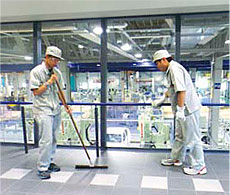
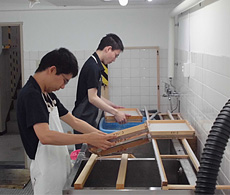
Percentage of Disabled Employees and Number of Disabled People hired (As of June 1 for Each Year) (non-consolidated, up until fiscal 2014, and has combined with Kawasaki Heartfelt Service since fiscal 2015)
| FY2014 | FY2015 | FY2016 | FY2017 | FY2018 | |
|---|---|---|---|---|---|
| Percentage of Employees |
1.79% | 1.95% | 2.11% | 2.18% | 2.26% |
| Number of people hired |
301 | 341.5 | 374.5 | 391 | 409 |
Note: People working short hours are accounted for at a factor of 0.5.
Note: One severely disabled person is counted as two people with disabilities.
Note: Numbers in fiscal 2018 are as of April 1,2017.
Supporting a Balance of Child Care, Nursing Care, and Work
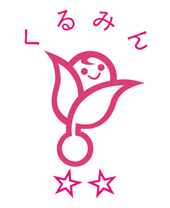
We have a number of systems to support raising the next generation and nursing care, in order to enable our employees to continue working actively while balancing work with childcare and nursing care.
Examples include a system of childcare leave available until employees’ children reach age three; a short-time working system available to employees with children until they graduate from elementary school; nursing care leave available for up to three years; holding seminars to support those on childcare leave who wish to return to work; a system whereby people can apply for reemployment when they are ready to return to work after resigning because of marriage, childbirth, child-raising, or other reasons; and a system that lets staff take time off in units of one hour at a time if needed to care for children or other family members. With initiatives in this area that go beyond national government standards, the Hyogo Labour Bureau certified us as a company supporting childcare, and awarded us the “Kurumin Mark” in 2010.
Also in fiscal 2013, congratulations leave granted to male employees at the childbirth of their spouse was expanded from two days to five days to encourage them to participate in child-raising.
Moreover, our systems have been further enhanced by such means as newly introducing in 2012 the Supplementary Work Day Nursery Service to offer temporary childcare services within company on supplementary work days and the Childcare Rescue System to offer baby-sitter services as designated by the company for employees requiring childcare services including nursing for sick or recovering children and during overtime duties or business trips.
Number of Employees Using Childcare or Care Leave (non-consolidated)
| FY2013 | FY2014 | FY2015 | FY2016 | FY2017 | |
|---|---|---|---|---|---|
| Childcare leave | 24 (1 men, 23 women) |
37 (2 men, 35 women) |
43 (4 men, 39 women) |
37 (9 men, 28 women) |
51 (8 men, 43 women) |
| Care leave | 3 (2 men, 1 women) |
0 | 2 (2 men, 0 women) |
2 (2 men, 0 women) |
0 |
Overview of Support Systems (non-consolidated)
| Parental leave before and after birth | Maternity/paternity leave | Employees may take leaves until a child reaches the age of three. There is no limit on the number of times leave can be taken. |
|---|---|---|
| Return to work support program “WIWIW” | Employees on maternity/paternity leave are provided with online services that enable them to get information and other materials to support their return to work, or allow them to enhance business skills, or promote communication with their office colleagues. | |
| Leave to care for sick/injured child | Employees receive five days each year for each child up to completion of elementary school. Kawasaki does not set a limit on the number of children used to calculate a five-day leave. (Legally,companies are only required to provide a total of up to 10 days per year to employees with two or more children.) | |
| Half-days off | Employees may take as many half-days off as necessary,within available annual paid leave, to care for a young child (up to completion of elementary school) or when morning sickness interferes with job duties. | |
| Accumulated leave* | Employees may use accumulated leave to care for a young child (up to completion of elementary school), care for a sick/injured child, or when morning sickness interferes with job duties. | |
| Use of flextime system | Employees may work on a flextime basis as necessary when looking after a young child (up to completion of elementary school) or when morning sickness interferes with job duties. | |
| Limits on out-ofhours work and work on days off | Employees may be exempted from out-of-hours work and work on days off until a child completes elementary school. | |
| Reduced working hours to care for young child | Standard working hours can be reduced up to a maximum of three hours a day until a child completes elementary school. | |
| Family (Nursing) care | Nursing care leave | Employees may take leave up to three times for one person requiring nursing care (three years at longest). |
Limits on out-of-hours work and work on days off for nursing care |
Employees may be exempted from out-of-hours work and work on days off up to once a year. | |
| Special leave for family care | Employees may take special leave of five days to care for an ailing or elderly family member. Kawasaki does not set a limit on the number of family members that employees must care for. (Legally, companies are only required to provide a total of up to 10 days per year to employees who have two or more family members in need of assistance.) | |
| Half-days off | Employees may take as many half-days off as necessary,within available annual paid leave, to care for an ailing or elderly family member. | |
| Accumulated leave* | Employees may use accumulated leave whenever necessary to care for an ailing or elderly family member. | |
| Use of flextime system | Employees may work on a flextime basis as necessary when looking after an ailing or elderly family member. | |
| Short-time working system for nursing care | Employees may shorten their working hours for at longest two hours a day (up to two times in three years). | |
| Other | Request for reemployment | Employees who resign to care for a child or an ailing/elderly family member may apply to be rehired when a change in their situation allows them to return to work. |
* Accumulated leave refers to annual paid vacation days that could not be carried over to the next year but can be taken in special circumstances.
Focus
Selected as Nadeshiko Brand (March 2015)
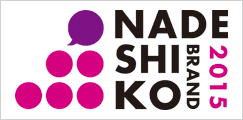
The Nadeshiko Issue is a recognition as excellent in "promoting participation in society of women" given to the businesses selected and introduced jointly by the Ministry of Economy, Trade and Industry and the Tokyo Stock Exchange from among approximately 1,800 TSE First Section listed companies showing good financial performance that won higher scores in each industry in term of the support they provide female employees in their (i) careers and (ii) work-life balance.
Based on the idea that it is indispensable for businesses to create such working environments and corporate culture that allow women to play active parts, the Company is focusing on active employment of women, activities of female employees' network called "4U (For You) Network," career & communication training for young women, and other activities. In addition, for the purpose of supporting employees' work-life balance, we provide financial aids for baby-sitter costs and seminars for employees returning from maternity/paternity leave and their supervisors.
Utilization of elderly persons
Kawasaki began action to extend the retirement age before the legal requirement was introduced by the revision of the Older Persons’ Employment Stabilization Law. Thus, in April 2006 the fixed retirement age for general employees was set at 63 through agreement between labor and management.
In addition, we operate a post-retirement reemployment system that in principle makes available post-retirement reemployment up to age 65 to all those who request it. These policies allow many veteran employees to remain involved in active operations where they can use their rich store of experience and pass on their skills.
Employees who have reached age 55 are invited to participate in a “Lifestyle Design Seminar,” which offers them the opportunity to find out about our schemes for postponing retirement and seeking reemployment and to consider afresh their lifestyle options following reemployment.
Number of People Rehired (non-consolidated)
| FY2013 | FY2014 | FY2015 | FY2016 | FY2017 |
|---|---|---|---|---|
| 145 | 150 | 167 | 214 | 243 |
Mid-Career Recruitment
With the aim of benefiting from diverse human resources, we are working actively in the area of mid-career recruitment. Recent years, Kawasaki has increased recruitment for responding business development, and we recruited 245 employees through this route in fiscal 2017. These recruits enjoy employment conditions equal to those of new graduates, while we benefit from the professional skills and strategic abilities they have built up.
Number of Mid-Career Recruits (non-consolidated)
| FY2013 | FY2014 | FY2015 | FY2016 | FY2017 | |
|---|---|---|---|---|---|
| Administrative and technical positions |
147 | 167 | 271 | 328 | 179 |
| Production positions | 223 | 58 | 199 | 169 | 66 |
| Total | 370 | 225 | 470 | 497 | 245 |
Topic
Enhancing On-site Nursery Facilities
A nursery opened at Kawasaki Motors Enterprise (Thailand) Co., Ltd. in April 2010. The nursery provides temporary care for employees’ children between the ages of one and four. As of March 2017, the nursery cares for the children of about 30 employees on a daily basis. Several more children are also registered at the nursery, and utilize it as necessary. The nursery is generally open from 7:30 to 17:15 to coincide with regular working hours, but if requested by more than a fixed number of employees, it is also made available during overtime or holidays.
The opening of the nursery means that parents can continue working with complete peace of mind, having left their children to be cared for nearby. From the employer’s viewpoint as well, the loss of skilled human resources due to childbirth or childcare is avoided, promoting a stable and committed workforce. The opening of the nursery has thus proved to be a measure with mutual advantages.
In Japan, meanwhile, we provide nursery facilities at the workplace on supplementary work days to offer childcare for limited periods.

Contact
If you need more information about our business,
please feel free to contact us.





